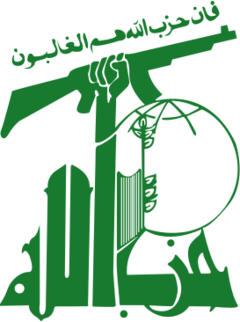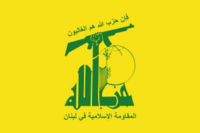Hezbollah facts for kids
Quick facts for kids
Islamic Resistance in Lebanon
المقاومة الإسلامية في لبنان
Al-Muqāwamah Al-Islāmīyah fī Lubnān |
|
|---|---|
 |
|
| Secretary-General | Naim Qassem |
| Deputy Secretary-General | Vacant |
| Head of the Executive Council | Vacant |
| Founder | Subhi al-Tufayli Abbas al-Musawi X Hassan Nasrallah X |
| Founded | 1985 (official) |
| Headquarters | Beirut, Lebanon |
| Religion | Shia Islam |
| National affiliation | March 8 Alliance |
| International affiliation | Axis of Resistance |
| Colours | Yellow and green |
| Seats in the Parliament |
15 / 128 (12%)
|
| Party flag | |
 |
|
Hezbollah (which means "Party of Allah" or "Party of God" in Arabic) is a political party and armed group in Lebanon. It is led by its Secretary-General, Naim Qassem. Hezbollah has both a political side, called the Loyalty to the Resistance Bloc, and an armed side. Its armed group is considered very strong, similar to a medium-sized army.
Hezbollah was formed in 1985 by Lebanese religious leaders. Its main goal was to fight against the Israeli invasion of Lebanon that happened in 1982. The group was inspired by the Iranian Revolution of 1979 and received support from Iran. They worked to unite different Lebanese Shia groups to resist the Israeli presence in Southern Lebanon.
Contents
Hezbollah's History and Role
Hezbollah's early goals included removing foreign forces like Americans and French from Lebanon. From 1985 to 2000, they fought against the South Lebanon Army and the Israel Defense Forces (IDF) in Southern Lebanon. They also fought the IDF again in the 2006 Lebanon War. In the 1990s, some Hezbollah members also helped fight in the Bosnian War.
Joining Lebanese Politics
Since 1990, Hezbollah has become a part of Lebanese politics. They have joined the government of Lebanon and formed political alliances. In 2008, they became part of a "national unity government." This gave them enough power to block decisions they disagreed with.
The Lebanese government also agreed that Hezbollah had the right to keep its armed group. This was to help them "liberate or recover occupied lands," like the Shebaa Farms. Hezbollah is part of a political group in Lebanon called the March 8 Alliance.
Support and Conflicts
Hezbollah has strong support among Lebanese Shia Muslims. However, some Lebanese Sunni Muslims do not agree with their goals. They also have some support in Christian areas of Lebanon.
Since 2012, Hezbollah has been involved in the Syrian civil war. They joined the Syrian government in fighting against opposition groups. They also sent fighters to Syria and Iraq to fight against the Islamic State between 2013 and 2015.
In the 2018 Lebanese election, Hezbollah and its allies won many seats in the Parliament of Lebanon.
Hezbollah's Strength and Influence
Even after Israel left South Lebanon, Hezbollah did not give up its weapons. Its armed group became even stronger than the Lebanese Army. Some people describe Hezbollah as a "state within a state" because it has so much power and influence.
Hezbollah has seats in the Lebanese government. It also runs its own radio station, Al-Nour, and a TV channel, Al-Manar. They also provide social services to people.
The group gets military training, weapons, and money from Iran. They also get political support from Syria. In 2021, Hezbollah's leader said the group had 100,000 fighters.
How Countries See Hezbollah
Many countries and groups have different views on Hezbollah. Some consider it a "terrorist organization," while others see it as a "resistance movement" or a "legitimate political force."
Countries that List Hezbollah as a Terror Group
| Country | Listing | Ref |
|---|---|---|
| The entire organization Hezbollah | ||
| The entire organization Hezbollah | ||
| The entire organization Hezbollah | ||
| The entire organization Hezbollah | ||
| The entire organization Hezbollah | ||
| The entire organization Hezbollah | ||
| The entire organization Hezbollah | ||
| The entire organization Hezbollah | ||
| Hezbollah's military wing | ||
| Hezbollah's military wing, France considers the political wing as a legitimate sociopolitical organization | ||
| The entire organization Hezbollah | ||
| The entire organization Hezbollah | ||
| The entire organization Hezbollah | ||
| The entire organization Hezbollah | ||
| The entire organization Hezbollah | ||
| Hezbollah's military wing | ||
| The entire organization Hezbollah | ||
| The entire organization Hezbollah | ||
| Hezbollah's military wing Al-Muqawama al-Islamiyya, since 2010 | ||
| The entire organization Hezbollah | ||
| The entire organization Hezbollah | ||
| The entire organization Hezbollah | ||
| The entire organization Hezbollah | ||
| The entire organization Hezbollah | ||
| The entire organization Hezbollah |
Countries that Do Not Consider Hezbollah a Terror Organization
| The entire organization Hezbollah | ||
| The entire organization Hezbollah | ||
| Maintains contacts with Hezbollah | ||
| Hezbollah allegedly operates a base in Cuba | ||
| Allegedly supports Hezbollah. Considers Hezbollah an organization of Lebanese patriotic forces | ||
| Considers Hezbollah a legitimate sociopolitical organization | ||
See also
 In Spanish: Hezbolá para niños
In Spanish: Hezbolá para niños
- Politics of Lebanon
- 2023 Israel–Hamas war
 | Victor J. Glover |
 | Yvonne Cagle |
 | Jeanette Epps |
 | Bernard A. Harris Jr. |

